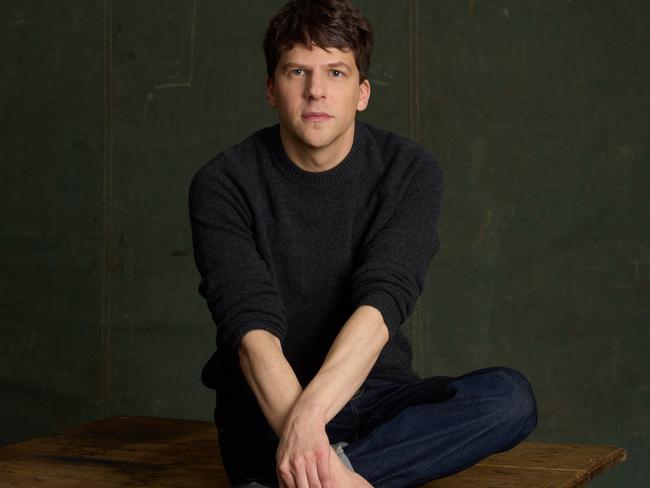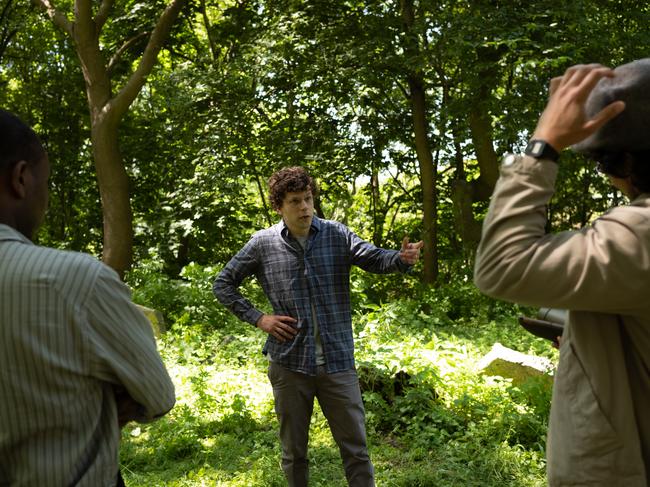A Real Pain star Jesse Eisenberg on his odd introduction to Kieran Culkin and wrestling with guilt
Jesse Eisenberg reveals why his first introduction to Succession star Kieran Culkin was unforgettable and how it led to his being cast in the acclaimed A Real Pain many years later.
Entertainment
Don't miss out on the headlines from Entertainment. Followed categories will be added to My News.
Jesse Eisenberg’s first meeting with his A Real Pain co-star Kieran Culkin was an inauspicious one – the Succession actor basically punched him in the nuts.
Eisenberg had already been cast alongside Kristen Stewart in the lead role of the 2009 rom-com Adventureland when former child star Culkin came in to read for the part of his friend.
“In the script, the character actually punches me in the crotch as a recurring theme and Kieran came in and he was the only actor all day to actually punch me there,” recalls Eisenberg over Zoom call from New York.
“And then he started kind of squeezing my neck, and kind of pushing me around during the audition, and I thought ‘God this is so strange that this guy has the absolute audacity to come into this audition room for a movie I am already cast in and just handle me like that’. And the other thought I had is he’s just a genius actor. He was so brilliant, even in this brief audition.”
Fast-forward 15 years – during which time Culkin became a household name and won an Emmy and a Golden Globe for playing the sad, caustic, broken Roman Roy in the hit drama Succession – and Eisenberg was looking for someone who could play his cousin in his second movie as a writer and director, the deeply personal comedy-drama A Real Pain.
On the page, Culkin’s character, Benji, was a charismatic, troubled, mercurial misfit with few boundaries or filters who would accompany Eisenberg’s meticulous, reserved and anxious David on a trip around Poland so they could explore their Jewish heritage and visit the home of their beloved grandmother.

“When I was thinking of who could play this part it occurred to me that I had this relationship already in my life and it was with Kieran,” says Eisenberg. “In this movie my character’s planning the trip, he’s the stable one and yet this other guy comes in and just totally destroys him, and that’s kind of what happened in this audition.”
It proved to be a masterstroke. Despite one of the producers being worried that David might be too similar to his role in Succession – which Eisenberg never saw – Culkin has won just about every supporting actor award handed out so far this awards season, and is a frontrunner in the category for next month’s Golden Globes and the 2025 Oscars. The funny thing though, says Eisenberg, who is also nominated for acting and writing Golden Globes, is that Culkin couldn’t care less.
“It’s exactly like this movie,” he says. “He doesn’t care about winning everybody over, but he just naturally does it. I so care about how I’m perceived by the group and whether no one likes me and he doesn’t care at all and everybody falls in love with him.”
Culkin, who was initially reluctant to be away from his family for the A Real Pain shoot in Poland, was famous on Succession for improvising many of Roman’s lines and the freewheeling approach to the script forced Eisenberg to change his directing style. And for someone who says he worries about just about everything, Eisenberg says he was constantly in awe of his co-star’s “complete lack of pretence”.
“I’m in an industry that celebrates vanity and people talking about their personal struggles, and he’s just so removed from any kind of pretence. He doesn’t want to talk about the script with me. He didn’t want to rehearse he just said, ‘let’s just go and do it’.

“And if I had a note for him, he would say ‘please don’t even give me the note, let’s just do it again’. He’s just so unpretentious. After a scene would end I would tell him ‘God, that was so amazing’ and he goes ‘Please shut up – stop, stop, stop’. He’s completely uninterested in praise, uninterested in awards and uninterested in talking about himself.”
The multi-talented Eisenberg also has plenty to be proud of in a career that started on Broadway while he was still a teenager. Since then, he’s written books, plays and films, starred in indie gems such as The Squid and the Whale and Holy Rollers as well as blockbusters including The Social Network, Batman V Superman: Dawn of Justice and the hit Now You See Me franchise.
But in Eisenberg’s 25-year professional career to date, one person remained resolutely unimpressed – his great aunt and mentor Doris, whose tough love, he says, “kept me sane”. Despite dying in the US in 2019 at the age of 106 after fleeing Poland during the Holocaust, Doris was the main inspiration for the grandmother character in A Real Pain and the reason Eisenberg wanted to explore the dark legacy that had left.
“I tried to impress her so much,” Eisenberg says with a laugh. “I would specifically ask The Tonight Show ‘can I talk about my aunt? She’ll be so happy if I talk about her on television’, and then we talked about her and I went to her house and we stayed up late to watch … and she just didn’t care at all.
“She was just unimpressed by anything except if I stood up straight and was a good person in society and being productive and not being self-pitying or indulging in nonsense.”

Eisenberg first started mulling over what would eventually become A Real Pain during a trip to Poland with his now wife, during which they visited Doris’s house, and it made him wonder what his life would be like if his ancestors hadn’t had to flee Nazi hate. After a few false starts, he finally cracked the idea for the screenplay when saw an online ad that was spruiking ‘Holocaust tours (with lunch)’.
He read the ad “with a mix of shock, awe and feeling icky” that he and others like him could be demanding creature comforts while viewing the horrors of his family history, and immediately set about writing a story in which the cousins David and Benji did just that.
The concept also spoke to the feeling of privilege that Eisenberg wrestles with every day as a successful artist. Thinking of the “thousand miracles” that had helped his great aunt and her family survive the horrors of World War II long enough to produce him, made Eisenberg realise that while the paranoia and anxiety that they passed down to him was well founded, many of his own worries were “not tied to anything real”.
“These are questions that I’m constantly asking myself as I walk around and spend four hours getting a scone in New York City because I have nothing to do during the day,” he says.
“And then I feel bad for myself that I spent all that time getting a scone when my family fled by the skin of their teeth on the last boat to get out of a genocide. It’s something I think about all the time, and I wanted to kind of make a movie about that feeling without being self-indulgent.”

Part of Eisenberg’s response to his feelings of guilt and privilege has been to try to live a life of service. His wife Anna Strout is an activist and teacher who started a disability justice centre in New York City and his mother-in-law ran a domestic violence centre in Bloomington, Indiana for 35 years.
“I’m surrounded by people in social work and strangely enough the happiest I’ve ever been in my life was during the pandemic,” Eisenberg says. “I was volunteering every day at this domestic violence shelter, and basically living and spending my days on behalf of other people was paradoxically much more enjoyable for me than spending the days in service of myself.
“A lot of research proves that we are happiest when we are helping and giving, so this is not an original thought I had, but was one that was really evocative for me. When I’m writing a movie or a play I’m kind of trying to wrestle with those ideas of living a good life.”
A Real Pain opens in cinemas on Boxing Day.
Originally published as A Real Pain star Jesse Eisenberg on his odd introduction to Kieran Culkin and wrestling with guilt


